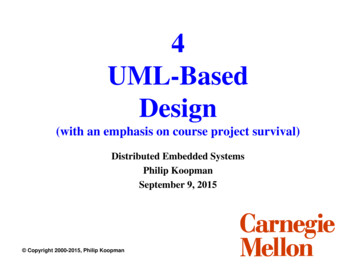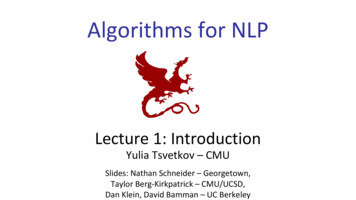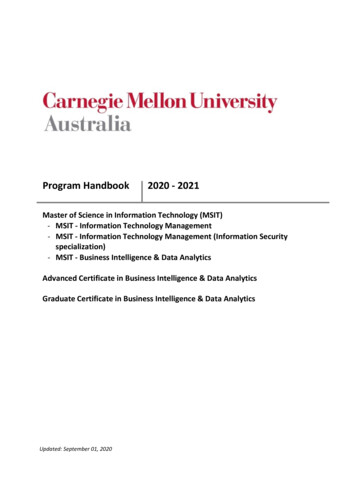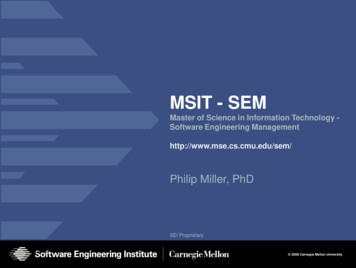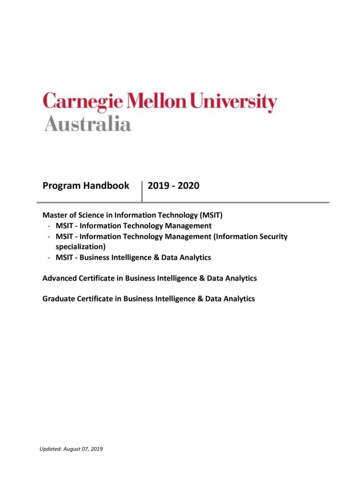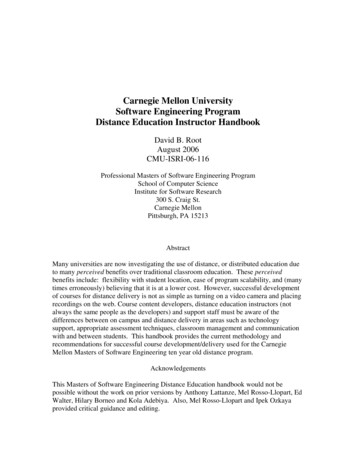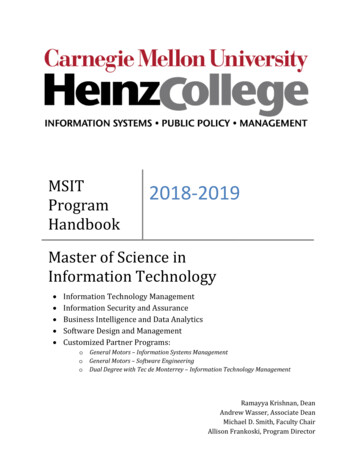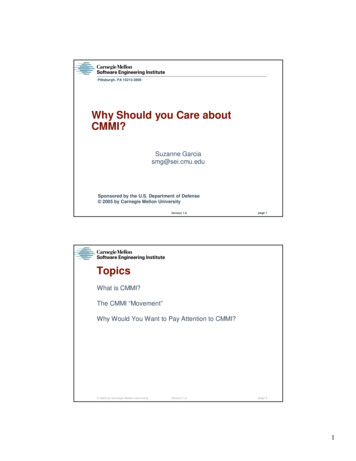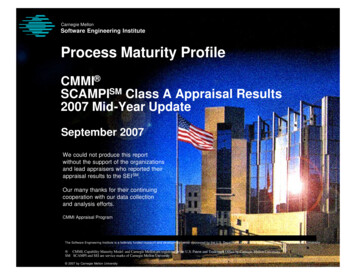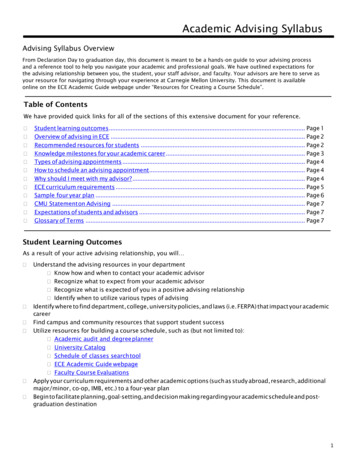
Transcription
Academic Advising SyllabusAdvising Syllabus OverviewFrom Declaration Day to graduation day, this document is meant to be a hands-on guide to your advising processand a reference tool to help you navigate your academic and professional goals. We have outlined expectations forthe advising relationship between you, the student, your staff advisor, and faculty. Your advisors are here to serve asyour resource for navigating through your experience at Carnegie Mellon University. This document is availableonline on the ECE Academic Guide webpage under “Resources for Creating a Course Schedule”.Table of ContentsWe have provided quick links for all of the sections of this extensive document for your reference. Student learning outcomes . Page 1Overview of advising in ECE . Page 2Recommended resources for students . Page 2Knowledge milestones for your academic career . Page 3Types of advising appointments . Page 4How to schedule an advising appointment . Page 4Why should I meet with my advisor? . Page 4ECE curriculum requirements . Page 5Sample four year plan . Page 6CMU Statement on Advising . Page 7Expectations of students and advisors . Page 7Glossary of Terms . Page 7Student Learning OutcomesAs a result of your active advising relationship, you will Understand the advising resources in your department Know how and when to contact your academic advisor Recognize what to expect from your academic advisor Recognize what is expected of you in a positive advising relationship Identify when to utilize various types of advisingIdentify where to find department, college, university policies, and laws (i.e. FERPA) that impact your academiccareerFind campus and community resources that support student successUtilize resources for building a course schedule, such as (but not limited to): Academic audit and degree planner University Catalog Schedule of classes search tool ECE Academic Guide webpage Faculty Course EvaluationsApply your curriculum requirements and other academic options (such as study abroad, research, additionalmajor/minor, co-op, IMB, etc.) to a four-year planBegin to facilitate planning, goal-setting, and decision making regarding your academic schedule and postgraduation destination1
Academic Advising SyllabusHow is Academic Advising Divided in ECE?ECE students have two different advisors. Once you are admitted into ECE at the end of your first year, you willbe assigned a staff advisor and a faculty advisor. Your academic advisor is a full time staff member that is here to assist you with curriculum questions,course questions, study abroad opportunities, or anything else pertaining to your academics. Your ECEacademic advisor is with you through the duration of your academic career in the department. Thereare four academic advisors within ECE: Mark Craven advises undergraduate & IMB ECE students with last names A-F. Arleyna Loss advises undergraduate & IMB ECE students with last names G-L. Monique Moreland advises undergraduate & IMB ECE students with last names M-S. Holly Skovira advises undergraduate & IMB ECE students with the last name T-Z Your faculty advisor is an ECE faculty member that is assigned to you for the duration of your sophomoreyear (in addition to your academic advisor). Your faculty advisor is a person that can help you decidewhat areas within ECE are related to your interests, help you with choosing courses, and help you plan acourse timeline within ECE. If you are not sure who your faculty advisor is, please contact your academicadvisor for assistance. Peer advisors are senior and MSIMB ECE students that have been trained on the curriculum andcreating course schedules that help to meet your career goals while keeping you on track for a timelygraduation. These students are available for meetings once the schedule of classes is released forthe following semester through registration.Valuable Resources for ECE StudentsECE has a lot of staff and connections on campus available to help you during your time at CMU! Don’t hesitate tovisit your staff advisor for advice on important people to know. We’ve included just a short list of some importantcontacts for you here. ECE Students Affairs Liaison: If you live on campus, this will be your Housefellow. If you live off campus, yourStudent Affairs liaison is M. Shernell Smith, mssmith@andrew.cmu.edu ECE Career Services Liaison: Ray Mizgorski, raymizgo@andrew.cmu.edu ECE HUB Liaison: Melissa Skasik, skasik@andrew.cmu.edu For advising questions on the General Education Requirements: Please contact Kurt Larsen if your last name begins with A-K. Please contact Treci Bonime if your last name begins with L-S. Please contact Annette Jacobson if your last name begins with T-W. Please contact Nisha Shukla if your last name begins with X-Z.Other Recommended Success ResourcesCMU Course Catalogcoursecatalog.web.cmu.edu/Career and Professional Development Centerwww.cmu.edu/career/ECE Academic Guide webpagebit.ly/ECEAreasStudent Academic Success Centerwww.cmu.edu/acadev/Stellic Academic Audit and Degree Planneracademicaudit.andrew.cmu.eduOffice of International Educationwww.cmu.edu/oie/HUB Schedule of Classes Search Toolbit.ly/HUBSOCCounseling and Psychological Serviceswww.cmu.edu/counseling/CMU Academic Calendarwww.cmu.edu/hub/calendar/index.htmlAlumni Advisor Networkhttps://cmu.firsthand.co/Disability Resourceswww.cmu.edu/disability-resources/Schedule a meeting with your advisorhttps://go.oncehub.com/ECEAdvisingTeam2
Academic Advising SyllabusThe following boxes present important milestones for each year of your academic career that we recommendyou be familiar with.Create a 4 year planUse the CMU Course Catalog to peruse course offerings, degree requirements, additional majors and minorsUse your Academic Audit to see your curriculum requirementsUse the ECE department website or CMU course catalog for information on department policiesMeet with your advisor for assistance with resources and help with crafting your planPrepare for advising appointmentsUse the CMU Academic Calendar to be familiar with academic dates and deadlinesRefer to our chart on page 4 to determine the type of advising appointment that you needIf your need requires a scheduled appointment, schedule a meeting ahead of timeBe prepared to talk about your life both in and outside of your classes to the degree you are comfortableConnect your educational plan to your career goalsUtilize your advisors to tailor your course selection to your career goalsExplore additional majors and minors related to your interestsUse the Career and Professional Development Center for assistance with career explorationUse the Alumni Advisor Network for advice on career and courseworkContact your faculty advisor throughout the yearSophomore yearPlan for a summer internship or researchUtilize the CPDC for resume and interview adviceInvestigate and attend career fairs such as the TOC or SPARKUse Handshake to search for internshipsUse online resources to search for available research opportunities or research faculty interestsUtilize the Undergraduate Research Office to find available funding or research opportunitiesBuild and refine connections with facultyMake plans for graduate school (if applicable)Know the difference between various types of graduate degreesAsk your advisor about the integrated MS optionsPrepare to take the GRE (or other entrance exams)Think about who you would ask for letters of recommendationJunior yearGraduate and prepare for your futureTriple check your graduation requirements with your advisor and academic auditSolidify your post-graduation plans for work or graduate schoolParticipate in commencement (optional but recommended)Know your options for participating in the alumni networkSenior year3
Academic Advising SyllabusDo you need to schedule an advising appointment?Your time, like ours, is valuable. If you just need our signature or to drop off a form, there’s no need to schedulean appointment. On the other hand, walk-in hours are not an appropriate time to discuss your academic plan andstudy abroad plans cannot be mapped out over email.AppointmentWalk-inDedicated time to meet used for:Email*First-come, first-served used for: Academic difficulty Form signature Personal difficulty Policy clarification Academic plan and goals IMB planningCheck-in or follow up from aprevious meeting Change of major Study abroad Financial Aid AcademicImprovement Plan Leave of Absence Transferring or withdrawing Questions about or requestingan overload schedule Used sparingly for: Clarifying what was discussed ata previous meeting Resource referral Graduation checkRegistration check** Please allow 24 hours for a reply.https://go.oncehub.com/ECEAdvisingTeamor click on the link in our email signature.Step 2: Select an appointment length.Step 3: Select your assigned advisor from the list.Why should I meet with my academic advisor?As an academic advisor, our role is to ensure that you are successful in your time at Carnegie Mellon University.Success looks different for every student, and in order for us to help you achieve your own definition of success,it’s important for us to understand what your priorities and goals are. The more we know about you and your owngoals, the more we can help you to craft your journey here at CMU. While you can minimally use your advisor tomake sure you are staying on track for a timely graduation, we are also here to help you utilize your resources asCMU in the most efficient and helpful ways possible. The list in the chart above is just a small number of thingsthat we are here to help you with.While we don’t wish for roadblocks or obstacles on your academic journey, most students take 8 semesters tograduate with a BS in ECE. Over the course of this time, it’s possible that you will encounter difficulties orchallenges. We are here not only to celebrate your successes, but also to help you in the times that life is not aseasy for you. If you’re struggling with any kind of personal difficulties—whether it is illness, personalchallenges, unexpected life events—please let your advisor know. It can be complicated and hard to navigatebeing a student on top of these kinds of circumstances, and we are happy to help you in any way that we can.4
Curriculum Requirements5 Areas of ECE:Device Sciences and Nanofabrication:Electromagnetic Fields and Waves, Optics, etc.Signals and Systems:Control Systems, Power Systems, etc.Circuits:For BS in Electrical and Computer Engineering,2020-21 Course Catalog Year: Total 379 UnitsCIT General Education Requirements: 75 unitsComputing @ Carnegie Mellon . 3 unitsInterpretation & Argument . 9 unitsInnovation & Internationalization . 9 unitsPeople, Places & Cultures . 9 unitsSocial Analysis & Decision Making . 9 unitsWriting & Expression . 9 unitsGeneral Education Electives x 3 . 27 units**Only 18 units of AP credit may count for this requirementExperiential Learning x 3 . 0 unitsDesign, etc.See bit.ly/CITGenEds for in-depth information about CITgeneral education requirements.Hardware Systems:Math/Science Requirements: 71 unitsLogic Design, Computer Architecture, etc.Software Systems:Compilers, Networks, Operating Systems, etc.Freshman Math I . 10 unitsFreshman Math II . 10 unitsPhysics I . 12 unitsPhysics II . 12 unitsMath/Science Electives x 2 . 18 unitsProbability & Statistics . 9 unitsGeneral Technical Requirements: 56 unitsVisit the ECE webpage atbit.ly/ECEAcademicGuide for detailedinformation about ECE courses and requirements.Important Notes: A full time course load is 36 units. The maximum number of units per semester is54 (55 for your fall sophomore year for 18-200). ECE students need to have a QPA of 3.5 in orderto overload. Please see your advisor withquestions about overloading. A ‘C’ or better is needed in all math courses(except math/science electives). 18-200 is a mini only offered in the fall semester.It is strongly recommended you take it duringyour sophomore year. Three semesters of Experiential Learning arerequired in order to graduate. Please don’t hesitate to contact your academicadvisor if you have any questions.Introductory Engineering Elective . 12 unitsMathematical Foundations of EE: 18-202 . 12 unitsConcepts of Mathematics: 21-127 . 10 unitsFundamentals of Programming & CS: 15-112 . 12 unitsPrinciples of Imperative Computation: 15-122 .10 unitsSee bit.ly/ECETechReq for in-depth information aboutECE math/science/technical requirements.ECE Course Requirements: 121 unitsIntroduction to ECE: 18-100 . 12 unitsECE Sophomore Seminar: 18-200.1 unitElectronic Materials & Analog Circuits: 18-220 .12 unitsSignals & Systems: 18-290 . 12 unitsIntroduction to Computer Systems: 18-213 . 12 unitsStructure & Design of Digital Systems: 18-240.12 unitsTwo courses in 1 of the ECE Areas . 24 unitsOne course in a different ECE Area. 12 unitsECE Coverage . 12 unitsECE Capstone Design Requirement . 12 UnitsFree Electives: 56 unitsFree electives consist of any course not required by anyof the above listed requirements. Up to 9 units of pass/fail credit can be used in this category.5
Sample 4 Year PlanThis plan is for demonstration purposes only—PLEASE always contact your advisor when making aschedule plan!Year 1Freshman Math 1 (10 units)Freshman Math 2 (10 units)Physics 1 (12 units)Physics 2 (12 units)Introduction to ECE (12 units)Engineering Intro Elective (12 units)Interpretation & Argument (9 units)General Education (9 units)43 unitsComputing @ CM (3 units)46 unitsYear 2ECE Sophomore Seminar (1 unit)ECE Core Requirement (12 units)Mathematical Foundations of EE (12 units)General Education (9 units)ECE Core Requirement (12 units)Concepts of Math (10 units)General Education (9 units)Free elective (9 units)Free elective (9 units)Experiential Learning (0 units)Experiential Learning (0 units)50 units55 unitsYear 3ECE Core Requirement (12 units)ECE Core Requirement (12 units)ECE Area 1 (12 units)ECE Area 2 (12 units)Probability & Statistics (9 units)General Education (9 units)Free elective (9 units)Math/Science Elective (9 units)General Education (9 units)Free elective (9 units)Experiential Learning (0 units)51 units51 unitsYear 4ECE Area 1 (12 units)ECE Capstone Requirement (12 units)ECE Coverage Requirement (12 units)General Education (9 units)Math/Science Elective (9 units)Free elective (9 units)General Education (9 units)Free elective (9 units)Free elective (3 units)39 units45 unitsWe strongly recommend that you utilize the Stellic Degree Planning tool to create a four year plan!6
Academic Advising SyllabusCarnegie Mellon University Institutional Statement on Academic AdvisingAcademic advising is integral to the educational mission of Carnegie Mellon. Advising is an intentional process,grounded in teaching and learning, and providing each student with guidance for developing and achievingmeaningful educational, professional, and personal goals. Successful advising at Carnegie Mellon depends upon ashared understanding of, and commitment to, the advising process by students, advisors and the University.Academic advisors engage students in learning, promote students’ academic success, and foster students’personal, ethical, and intellectual growth, all of which will carry into their roles as citizens and lifelong learners.Expectations of Students Demonstrate respect for others and self at alltimes Be knowledgeable of degree requirements Take ownership of your academic plan andperformance using a variety of resources andtools Adhere to Carnegie Mellon standards, policiesand procedures: www.cmu.edu/student-affairs/theword/ Seek out advisors, faculty interactions, contacts,and information on a regular basis Utilize campus resources (including your advisor),systems and planning tools Check your Andrew email account regularly (alsoduring breaks), manage your inbox and respondto actionable items Be actively engaged with your academic advisorand adhere to deadlines Be prepared to collaborate with your advisor toset goals and to trouble shoot problemsExpectations of Advisors Demonstrate respect for others and self at alltimes Be knowledgeable of and communicate degreerequirements Empower students to create an academic plan inattainment of degree completion and academicgoals Advocate for student success and development Be knowledgeable about Carnegie Mellon’sstandards, policies and procedures:www.cmu.edu/student-affairs/theword/ Serve as a liaison for students with campus resources, faculty and professional staff Respond to email in a timely manner and beavailable to students during regularly scheduledoffice hours Maintain courteous, respectful and supportiveadvising environment Collaborate with students to generate solutionsto challenges and to re-frame issues for growth Appreciate and advocate for diversity and equityin line with the university’s strategic plan Adhere to the guidelines set forth by the Familyand Educational Rights and Privacy Act (FERPA)Glossary Academic audit: An academic audit is a tool both you and your academic advisor will use throughout youracademic career to track your progress towards graduation. The current CMU academic audit is housedwithin Stellic.Course Catalog: The undergraduate course catalog is your contract with CMU. It outlines degreerequirements, courses and minors, academic policies, and much more. The year you entered CMU as a fullymatriculated student is known as your “catalog year,” and you’ll be bound by the requirements as outlined inyour catalog year, even if they change in the future. IMB: The Integrated Master’s/Bachelor’s program allows students to pursue an undergraduate andgraduate degree simultaneously. Students typically take between 4 and 5 years to finish the IMB program. Stellic: Stellic is the interactive academic planning platform you can use to view your degreerequirements, plan courses into the future, and easily see which courses will satisfy each of your graduationrequirement
As an academic advisor, our role is to ensure that you are successful in your time at Carnegie Mellon University. Success looks different for every student, and in order f
